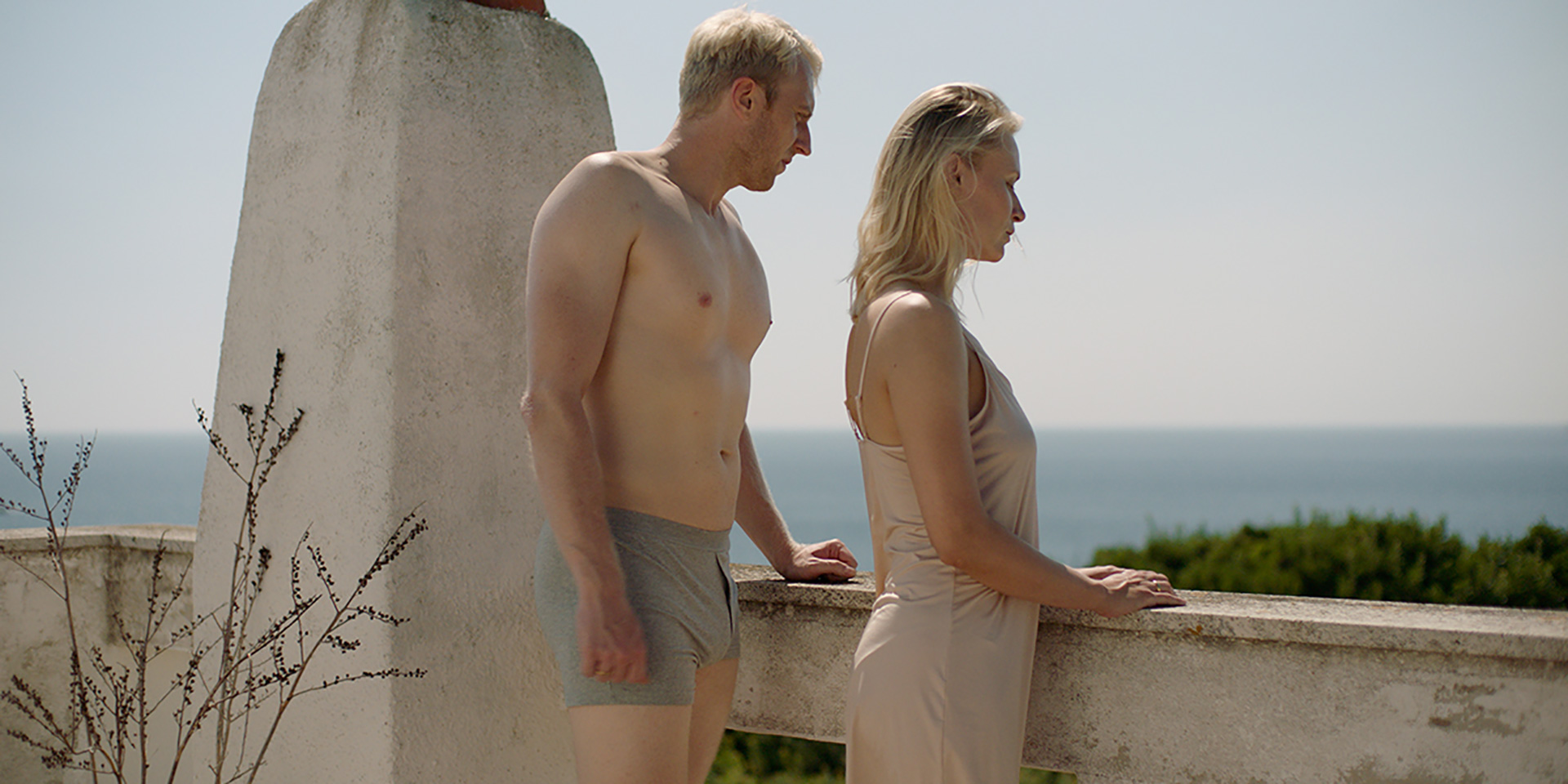Desperate for respite from their bourgeois lives in Poland, Adam (Dobromir Dymecki) and Anna (Agnieszka Zulewska) decide to vacation on a tiny Italian island. They wanted a big house with a pool and scenic view to get the most alone time possible. While a genial local (Marcello Romolo’s Fabio) promised exactly that, the pool is found empty and in disarray. He offers a discount. They refuse. He offers a free dinner at his trattoria in town. They explain that food won’t fix anything. Only when Adam asks Fabio what the problem is—considering the damage looks like a two-day job at most—does he agree to hire someone to make things right. A jackhammer wakes Anna the next morning.
First-time feature director Agnieszka Woszczynska (who co-wrote with Piotr Litwin) ensures this couple’s entitlement is on full display from the start of Silent Land. Anna packs the fridge with alcohol. Adam passes through the house to see what’s broken. And neither felt a need to gain even a cursory knowledge of Italian. Fabio luckily understands English enough to communicate with them, but the Arab migrant worker (Ibrahim Keshk’s Rahim) he hires to fix the pool does not. Perhaps that’s why they don’t even bother saying “Hello,” let alone offer him a drink upon sitting to breakfast. It doesn’t, however, explain their conscious choice to set the security alarm before beginning their run. No wonder Rahim worries they’ll assume theft when searching for their hose.
More than an escape from their daily lives, this trip seems an escape from responsibility of any kind. Do they really need the pool when their rental is literally on a beach with water for them to swim in, or are they just looking to force Fabio to make good on his word? They hear a wounded animal one night only to find Adam barely shifting in his chair before Anna gets up, looks out over the terrace, and comes back shrugging. This holiday is for rest, food, and sex. Everything else can work itself out without them—including a tragic accident that leaves Rahim floating dead in a foot of water still holding strong precisely because he completed the task for which he was hired.
Woszczynska expertly plays with time and context to have us believe one thing about their whereabouts during the incident while letting their answers during police interrogation provide a contrasting account. Add the CCTV cameras supplying yet a third variation and you must wonder what is going through Adam and Anna’s heads. The easy answer is nothing. They aren’t trying to be malicious or withholding; they’re merely indifferent to the life of a young man they couldn’t be bothered to meet and who “wasn’t here legally” anyway. When that sense of callous morality is shared, it doesn’t feel out of the ordinary. When the subsequent investigation unearths details that poke holes in their assumptions, it starts to eat away at their resolve. Are they monsters or unfortunate victims themselves?
Their individual paths to an answer inevitably strain what had seemed like an idyllic relationship. Their sex habits change. Their appetites shift. Adam’s desire to be alone is suddenly at contrast to Anna’s need for company, the latter making friends with husband-wife scuba instructors (Jean-Marc Barr’s Arnaud and Alma Jodorowsky’s Claire). Adam begins having a recurring nightmare as a form of reckoning while Anna deflects her own guilt onto him so as not to confront it at all. The lies pile up, their aggression rises, and accusations exit their mouths as easy as breath until they cannot even look at each other without thinking of the man who died a few yards away and thus exposed who they really are.
While that dissolution would prove captivating enough on its own, Woszczynska and Litwin have chosen their setting with intention beyond one compromised couple. Italy is geographically positioned as ground zero for the North African and Middle Eastern refugee crises, and this little island isn’t exempt no matter how much its residents may wish it were. Tourism is down (as mentioned by Claire). The military has moved in (as evidenced by the police station ceding space). And flippant remarks like Arnaud stating how this place is safe “for the invited” introduce much darker trends that belie the postcard-ready vistas and jovial hosts bending over backwards to sell Adam and Anna on their home’s “true” worth. While safe and “amongst friends,” however, this reality also exposes their own inherent bigotry.
Suddenly everything we’ve seen becomes colored by profits. Who’s worth more to the island’s reputation? Rahim or a white, European couple? Does the answer purposefully drive their actions or are they blind to it until hindsight throws it back in their faces? Add a mangy dog roaming and scavenging the scraps of those who eat in excess—before being put down as a mercy, rather than saved as an imperative—and the message at the back of Silent Land can’t help scream for you to take notice. Because it’s not about whether Adam and Anna will be able to survive this tense, tragic, and introspective week; it’s that it doesn’t matter if they do. Together or alone, they’ll still invariably live.
Others don’t have that luxury. Where Adam and Anna choose a destination for relaxation (she fondly recalls spending time in Egypt years ago before admitting “it’s better to stay in Europe now”), others have also chosen this side of the Mediterranean because they’re struggling to survive. That the latter becomes the former’s inconvenience says everything. That expediting their death becomes more cost-efficient than figuring out a way to legitimately assist them proves we’re already too far gone as a species for redemption. I guarantee Rahim gets no pleasure from haunting their lives afterwards. He doesn’t revel in watching Dymecki and Zulewska’s gradual emotional implosion because he’s not actually watching it. He’s merely a manifestation of their characters’ guilt and thus our cautionary tale to absorb.
Silent Land premiered at the Toronto International Film Festival.

